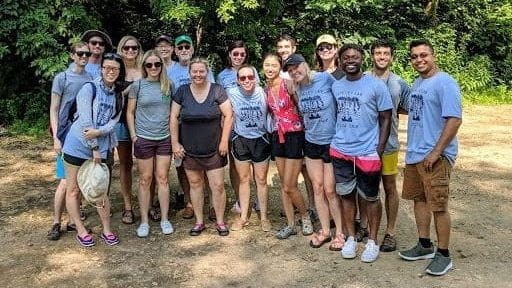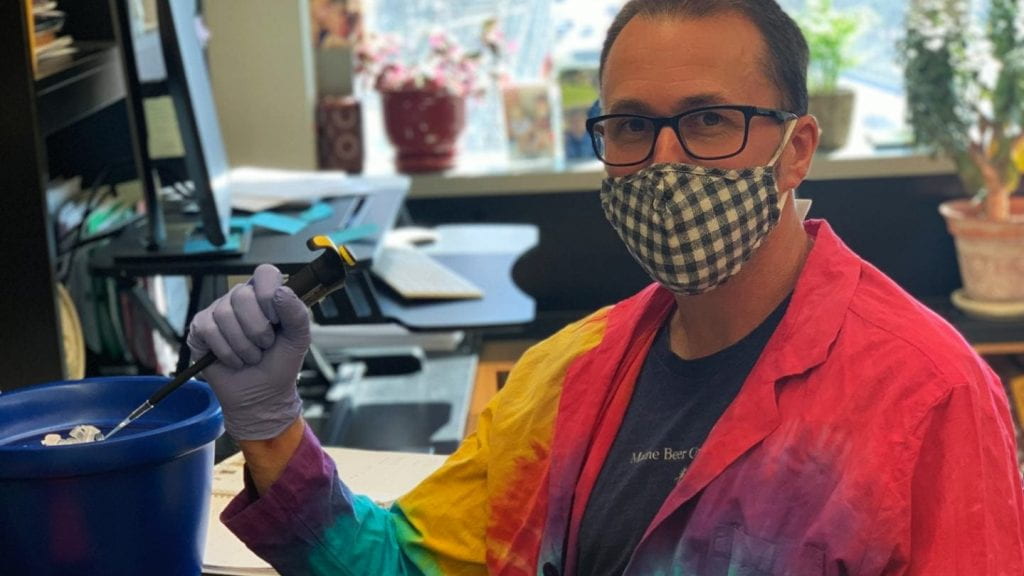Since the launch of the Green Labs program in January of 2020, dozens of laboratories across WashU campuses have taken action to reduce their environmental impact. The Green Labs Spotlight series aims to recognize labs that adopt exemplary sustainability practices, celebrate them for their efforts, and inspire other labs to take action.
The first featured lab in the Green Labs Spotlight series is the lab of Dr. Timothy Ley on the School of Medicine Campus. The Ley Lab studies cancer genomics within the Division of Oncology and they were one of the earliest members of the Green Lab Program when it began in early 2020.
Daniel George – the lab manager and Green Lab liaison – and his colleagues are eager to reduce the environmental impacts of their research activities, advance sustainability, and expand recycling at WUSM. In 2019, the Division of Oncology won a Sustainability Leadership Award for their dedication to the Green Office Program. Now, they are rising stars in the Green Labs Program too!

Focusing on Waste Reduction
Waste reduction and recycling is a high priority for Dan and his labmates. By planning each experiment thoroughly, the team is actively working to reduce single-use plastic and other waste generated from their experiments. As the lab manager, Dan orders supplies for all of their research activities and he purchases regularly-used items in bulk to reduce packaging and shipments coming to the campus.
The Ley Lab also returns polystyrene (Styrofoam) coolers back to the lab supply vendors, which is often a hidden or poorly advertised program. Millipore Sigma and New England BioLabs (NEB) both accept empty Styrofoam coolers back for reuse. To return your lab’s coolers: first, hang up a return program poster in your lab! Then, researchers need to look for a “free return shipping” label on the package – then they just have to empty the cooler, tape it shut (and/or put back in the cardboard box), make sure the shipping label is visible, and submit to campus Mail & Receiving Services! NEB and ThermoFisher are also moving towards recyclable cardboard shipping boxes instead of polystyrene altogether, which Dan is really excited about.
Reduction is always the best first step to tackle waste. If materials cannot be reused or repurposed in some way, the last step is correctly sorting waste into recycling and landfill (and the other specialty unwanted material streams in laboratories). The Ley Lab used the online signage request form to obtain new recycling posters for their lab. By hanging these posters in key locations in the lab, the team has observed a reduction in recycling contamination and in landfill waste. What is and isn’t recyclable can be confusing and it is always a learning process, but starting with signage and education is an easy way to minimize contamination. Dan and his colleagues work hard to educate each other on recycling best practices in their lab and break rooms by hanging up reminders and removing contaminants from the recycling cans.
It was amazing how many people were using the recycling containers for non-recyclable materials. We have improved the signage explaining what is recyclable and what is not. I still have to pull the occasional banana peel or chip bag out of the containers, but it’s not nearly as bad as it was.
Daniel George, Ley Lab manager and Green Lab liaison
Adjusting for the Pandemic
The coronavirus pandemic has impacted supply chains across the globe, affecting researchers in ways they never expected. A shortage of basic lab supplies has caused researchers to reduce and plan experimental processes to use as few pipette tips and other supplies as possible.
While these limitations are all but desirable, they often forced labs to become more resourceful and therefore resilient to future potential crises. For instance, researchers ended up opting for reusable materials instead of single-use ones; considering local manufacturers less affected by global shortages; and planning experiments to use supplies and resources more efficiently. These changes in behavior are expected to last in time as they are not only necessary to navigate the pandemic environment, but also beneficial for environmental sustainability and resiliency.
Experiments are planned out as much as possible which reduces waste. The availability of consumables has been greatly impacted by the pandemic, so everyone in my group is very aware of how many tips, plates, tubes, gloves, etc. it may take to get an experiment done. That is a lesson we have learned out of necessity that can be applied to greener lab operations from here on out.
Daniel George, Ley Lab manager and Green Lab liaison
Looking Forward
Dan is particularly interested in reducing and recycling plastic bags from the lab. Plastic film (or plastic bags) can be collected and brought back to local stores, but a collection program is not available on campus. Dan says “eliminating that one waste stream would make a HUGE impact.”
Often times, sustainability is a moving target, and there are always ways to improve and goals to work towards. Having The Ley Lab on board to help shepherd the Green Labs Program forward will surely lead to positive change on the WUSM campus and beyond.
I’m incredibly proud of the work of Dan and all of our lab members to implement the Green Lab Program. We are all deeply committed to reducing waste and increasing sustainability. This program is a daily reminder of how much material we consume, and how far we still have to go to reduce our waste burden even more. The main thing is that we’re making progress on the goal, and we do a little better every day.
Dr. Timothy Ley
To learn more and join the green labs program, visit greenlabs.wustl.edu or email greenlabs@wustl.edu
